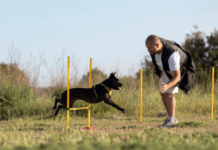Last Updated on October 4, 2024 by Dogs Vets
Discover certified dog trainer courses that fetch your future! Unleash your potential and connect with top training organizations.
Importance of Certification
Certification plays a vital role in the field of dog training, providing numerous benefits and opportunities for those who complete accredited dog training courses. Let’s explore the importance of certification for aspiring dog trainers.
Job Prospects for Certified Graduates
Completing a certified dog trainer course significantly enhances job prospects for graduates. Many dog trainer companies actively seek certified professionals for professional employment, with some companies exclusively hiring graduates from reputable dog trainer programs.
Certified graduates have a competitive edge over non-certified individuals, especially if they are willing to relocate for job opportunities.
The demand for certified dog trainers continues to grow, as pet owners increasingly seek professional guidance for their furry companions. According to the Bureau of Labor Statistics, jobs related to dog training are projected to increase by 16% by 2031 (Penn Foster). This growth further highlights the importance of certification in securing employment in this expanding industry.
Opportunities for Certified Dog Handlers
Certified dog handlers, particularly those specializing in fields such as police dog training, have a wide range of employment opportunities. These opportunities become even more extensive for those willing to travel and work across different regions and even overseas (Dog Trainer College). Due to the specialized nature of this field, there are often fewer applicants, increasing the chances of securing a rewarding job.
Moreover, many graduates of dog trainer or dog handler programs choose to start their own training businesses. These programs provide students with the necessary information and skills to establish successful ventures, offering an alternative to working for others in the field (Dog Trainer College). Aspiring entrepreneurs in the dog training industry can leverage their certification to attract clients and build a reputable business.
To enhance employment opportunities further, it’s beneficial to establish professional relationships with top dog trainer companies. These connections can facilitate job placements and career advancement in the field.
For example, Dog Trainer College maintains partnerships with leading dog trainer companies in the United States, enabling them to connect former students with employment opportunities in the dog training or handling industry.
By obtaining certification through accredited dog training courses, individuals can unlock a wide range of job prospects and professional opportunities in the field of dog training and handling. Certification not only provides the necessary knowledge and skills but also demonstrates credibility and commitment to the profession.
Whether working for established dog trainer companies or starting their own businesses, certified dog trainers and handlers are well-positioned for success in this rewarding industry.
Starting Your Own Business
For individuals who are passionate about dog training and want to take their skills to the next level, starting your own dog training business can be a rewarding and fulfilling career path. The field of dog training offers various opportunities for entrepreneurship and connecting with hiring companies.
Entrepreneurship in Dog Training
Many graduates of accredited dog training courses opt to start their own training business. These courses are designed to provide students with the necessary information and skills to establish successful businesses in the field of dog training.
By starting your own business, you can have more control over your schedule, client base, and training methods. It allows you to tailor your services to meet the specific needs of dog owners in your area.
Starting a dog training business involves careful planning and consideration. It’s essential to develop a solid business plan that outlines your target market, marketing strategies, pricing structure, and any additional services you may offer.
Building a strong online presence through a professional website and social media platforms can help attract clients and establish credibility in the industry. Networking with other professionals in the field, such as veterinarians and dog training schools, can also lead to potential referrals and partnerships.
Connecting with Hiring Companies
While some individuals prefer the independence of running their own business, others may choose to work for established dog training companies. These companies often seek certified graduates from reputable dog training programs for professional employment.
In fact, some companies exclusively hire graduates from accredited programs, recognizing the value of their training and expertise.
To connect with hiring companies, it can be beneficial to maintain professional relationships with top dog trainer companies in your area. Some accredited dog training programs, like Dog Trainer College, facilitate these connections between hiring companies and former students who are looking for employment opportunities in the field of dog training or handling (Dog Trainer College).
Networking events, industry conferences, and online platforms dedicated to dog training professionals can also provide opportunities to connect with potential employers.
By exploring entrepreneurship and connecting with hiring companies, you can navigate the diverse career paths available in the field of dog training. Whether you choose to start your own business or work for established companies, the skills and knowledge gained from accredited dog training courses will provide a solid foundation for success.
Remember to stay informed about industry trends and continually update your training techniques to ensure you are providing the best possible services to your clients.
Certification Options
When considering a career in dog training, obtaining certification can be a valuable step towards establishing credibility and demonstrating your expertise. While certification is not a requirement for becoming a dog trainer, it is considered a distinguishing feature in the field.
In this section, we will explore two prominent certification options: the Certification Council for Professional Dog Trainers (CCPDT) and the Pet Professional Accreditation Board (PPAB).
Certification Council for Professional Dog Trainers
The Certification Council for Professional Dog Trainers (CCPDT) offers a variety of certifications, including the Certified Professional Dog Trainer-Knowledge Assessed (CPDT-KA) and the Certified Professional Dog Trainer-Knowledge and Skills Assessed (CPDT-KSA). These certifications are recognized and respected within the industry.
The CPDT-KA exam is a multiple-choice exam consisting of 200 questions. It is administered at computer-based testing facilities throughout the United States, internationally, and also via remote proctoring.
To be eligible to take the CPDT-KA exam, individuals must meet certain requirements, including being at least 18 years old, holding a high school diploma or equivalent, and having a minimum of 300 hours of experience in dog training within the last 3 years (CCPDT).
The CPDT-KSA certification is a skills-based certification that assesses expert training and instruction skills through hands-on exercises. To be eligible for the CPDT-KSA exam, individuals must hold a current CPDT-KA credential, complete an online application, upload a video of assigned training exercises, and meet compliance with various standards and ethics policies (CCPDT).
Pet Professional Accreditation Board
The Pet Professional Accreditation Board (PPAB) is another well-known organization that offers certifications for dog trainers. Their certifications include the Professional Canine Trainer – Accredited (PCT-A) and the Professional Canine Behavior Consultant – Accredited (PCBC-A).
The PCT-A certification is designed for individuals who have demonstrated their knowledge and skills in training dogs. It requires candidates to complete a comprehensive examination that covers topics such as learning theory, training techniques, and behavior management. The PCBC-A certification, on the other hand, is intended for professionals who possess advanced knowledge in canine behavior and can provide behavior consulting services.
The PPAB certifications are recognized globally and can enhance your professional credibility as a dog trainer. By obtaining these certifications, you demonstrate your commitment to ongoing education and staying up-to-date with the latest industry standards and practices.
When choosing a certification, it’s important to consider your career goals, the requirements of each certification program, and the level of expertise you wish to achieve. By obtaining certification from reputable organizations like the CCPDT or PPAB, you can enhance your skills, expand your knowledge, and increase your job prospects within the dog training industry.
Becoming a Certified Dog Trainer
For those passionate about working with dogs and helping them learn and thrive, becoming a certified dog trainer is an excellent career choice. Certification not only provides credibility but also demonstrates a commitment to professional development and ethical practices.
Two prominent certifications in the field of dog training are the Certified Professional Dog Trainer-Knowledge Assessed (CPDT-KA) and the Certified Professional Dog Trainer-Knowledge and Skills Assessed (CPDT-KSA). Let’s explore the eligibility requirements and certification process for each.
Eligibility for CPDT-KA Exam
To be eligible to take the CPDT-KA exam, individuals must meet specific requirements set by the Certification Council for Professional Dog Trainers (CCPDT). These requirements include:
- Being at least 18 years old.
- Holding a high school diploma, GED, or equivalent.
- Accumulating a minimum of 300 hours of experience in dog training within the last three years.
- Providing professional references.
- Demonstrating skills and knowledge in areas such as learning theory, teaching techniques, ethology, and more.
It’s important to note that these are some of the key eligibility requirements, and candidates should review the complete list of requirements on the CCPDT website.
CPDT-KSA Certification Process
The CPDT-KSA certification is a skills-based certification that evaluates expert training and instruction skills through hands-on exercises. This certification is available to individuals who already hold the CPDT-KA credential.
To pursue the CPDT-KSA certification, candidates must:
- Hold a current CPDT-KA credential.
- Complete the online application provided by the CCPDT.
- Upload a video showcasing assigned training exercises that demonstrate their practical training skills.
- Meet compliance with various standards and ethics policies set by the CCPDT.
Once the application and video submission have been reviewed and approved, candidates will receive further instructions for scheduling the hands-on assessment.
Both the CPDT-KA and CPDT-KSA certifications require recertification every three years. Recertification can be achieved by accumulating the required Continuing Education Units (CEUs) or by retaking the certification exam. This process ensures that certified dog trainers stay updated with the latest industry trends and continue to refine their skills.
By becoming a certified dog trainer, individuals can enhance their professional credentials, gain confidence in their abilities, and open doors to various career opportunities.
Whether working independently or with established training organizations, certified dog trainers play a vital role in helping dogs and their owners build a strong bond based on trust and effective communication.
Fact Check
We strive to provide the latest valuable information for pet lovers with accuracy and fairness. If you would like to add to this post or advertise with us, don’t hesitate to reach us. If you see something that doesn’t look right, contact us!























